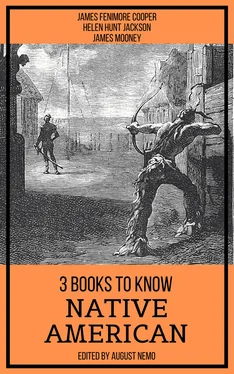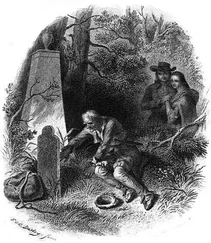“‘Twould be, indeed, a bloody path for tender feet to wade in,” returned the equally reluctant scout; “but I thought it befitting my manhood to name it. We must then turn on our trail and get without the line of their look-outs, when we will bend short to the west, and enter the mountains; where I can hide you, so that all the devil’s hounds in Montcalm’s pay would be thrown off the scent, for months to come.”
“Let it be done, and that instantly.”
Further words were unnecessary; for Hawkeye, merely uttering the mandate to “follow,” moved along the route by which they had just entered their present critical and even dangerous situation. Their progress, like their late dialogue, was guarded, and without noise; for none knew at what moment a passing patrol, or a crouching picket of the enemy, might rise upon their path. As they held their silent way along the margin of the pond, again Heyward and the scout stole furtive glances at its appalling dreariness. They looked in vain for the form they had so recently seen stalking along its silent shores, while a low and regular wash of the little waves, by announcing that the waters were not yet subsided, furnished a frightful memorial of the deed of blood they had just witnessed. Like all that passing and gloomy scene, the low basin, however, quickly melted in the darkness, and became blended with the mass of black objects in the rear of the travellers.
Hawkeye soon deviated from the line of their retreat, and striking off towards the mountains which form the western boundary of the narrow plain, he led his followers, with swift steps, deep within the shadows that were cast from their high and broken summits. The route was now painful; lying over ground ragged with rocks, and intersected with ravines, and their progress proportionately slow. Bleak and black hills lay on every side of them, compensating in some degree for the additional toil of the march, by the sense of security they imparted. At length the party began slowly to climb a steep and rugged ascent by a path that curiously wound among rocks and trees, avoiding the one, and supported by the other, in a manner that showed it had been devised by men long practised in the arts of the wilderness. As they gradually rose from the level of the valleys, the thick darkness which usually precedes the approach of day began to disperse, and objects were seen in the plain and palpable colors with which they had been gifted by nature. When they issued from the stunted woods which clung to the barren sides of the mountain, upon a flat and mossy rock that formed its summit, they met the morning, as it came blushing above the green pines of a hill that lay on the opposite side of the valley of the Horican.
The scout now told the sisters to dismount; and taking the bridles from the mouths, and the saddles off the backs of the jaded beasts, he turned them loose, to glean a scanty subsistence among the shrubs and meagre herbage of that elevated region.
“Go,” he said, “and seek your food where natur’ gives it you; and beware that you become not food to ravenous wolves yourselves, among these hills.”
“Have we no further need of them?” demanded Heyward.
“See, and judge with your own eyes,” said the scout, advancing towards the eastern brow of the mountain, whither he beckoned for the whole party to follow; “if it was as easy to look into the heart of man as it is to spy out the nakedness of Montcalm’s camp from this spot, hypocrites would grow scarce, and the cunning of a Mingo might prove a losing game, compared to the honesty of a Delaware.”
When the travellers reached the verge of the precipice, they saw, at a glance, the truth of the scout’s declaration, and the admirable foresight with which he had led them to their commanding station.
The mountain on which they stood, elevated, perhaps, a thousand feet in the air, was a high cone that rose a little in advance of that range which stretches for miles along the western shores of the lake, until meeting its sister piles, beyond the water, it ran off towards the Canadas, in confused and broken masses of rock, thinly sprinkled with evergreens. Immediately at the feet of the party, the southern shore of the Horican swept in a broad semicircle, from mountain to mountain, marking a wide strand, that soon rose into an uneven and somewhat elevated plain. To the north stretched the limpid, and, as it appeared from that dizzy height, the narrow sheet of the “holy lake,” indented with numberless bays, embellished by fantastic headlands, and dotted with countless islands. At the distance of a few leagues, the bed of the waters became lost among mountains, or was wrapped in the masses of vapor that came slowly rolling along their bosom, before a light morning air. But a narrow opening between the crests of the hills pointed out the passage by which they found their way still farther north, to spread their pure and ample sheets again, before pouring out their tribute into the distant Champlain. To the south stretched the defile, or rather broken plain, so often mentioned. For several miles in this direction, the mountains appeared reluctant to yield their dominion, but within reach of the eye they diverged, and finally melted into the level and sandy lands, across which we have accompanied our adventurers in their double journey. Along both ranges of hills, which bounded the opposite sides of the lake and valley, clouds of light vapor were rising in spiral wreaths from the uninhabited woods, looking like the smokes of hidden cottages; or rolled lazily down the declivities, to mingle with the fogs of the lower land. A single, solitary, snow-white cloud floated above the valley, and marked the spot beneath which lay the silent pool of the “bloody pond.”
Directly on the shore of the lake, and nearer to its western than to its eastern margin, lay the extensive earthen ramparts and low buildings of William Henry. Two of the sweeping bastions appeared to rest on the water which washed their bases, while a deep ditch and extensive morasses guarded its other sides and angles. The land had been cleared of wood for a reasonable distance around the work, but every other part of the scene lay in the green livery of nature, except where the limpid water mellowed the view, or the bold rocks thrust their black and naked heads above the undulating outline of the mountain ranges. In its front might be seen the scattered sentinels, who held a weary watch against their numerous foes; and within the walls themselves, the travellers looked down upon men still drowsy with a night of vigilance. Towards the southeast, but in immediate contact with the fort, was an entrenched camp, posted on a rocky eminence, that would have been far more eligible for the work itself, in which Hawkeye pointed out the presence of those auxiliary regiments that had so recently left the Hudson in their company. From the woods, a little farther to the south, rose numerous dark and lurid smokes, that were easily to be distinguished from the purer exhalations of the springs, and which the scout also showed to Heyward, as evidences that the enemy lay in force in that direction.
But the spectacle which most concerned the young soldier was on the western bank of the lake, though quite near to its southern termination. On a strip of land, which appeared, from his stand, too narrow to contain such an army, but which, in truth, extended many hundreds of yards from the shores of the Horican to the base of the mountain, were to be seen the white tents and military engines of an encampment of ten thousand men. Batteries were already thrown up in their front, and even while the spectators above them were looking down, with such different emotions, on a scene which lay like a map beneath their feet, the roar of artillery rose from the valley, and passed off in thundering echoes, along the eastern hills.
Читать дальше












